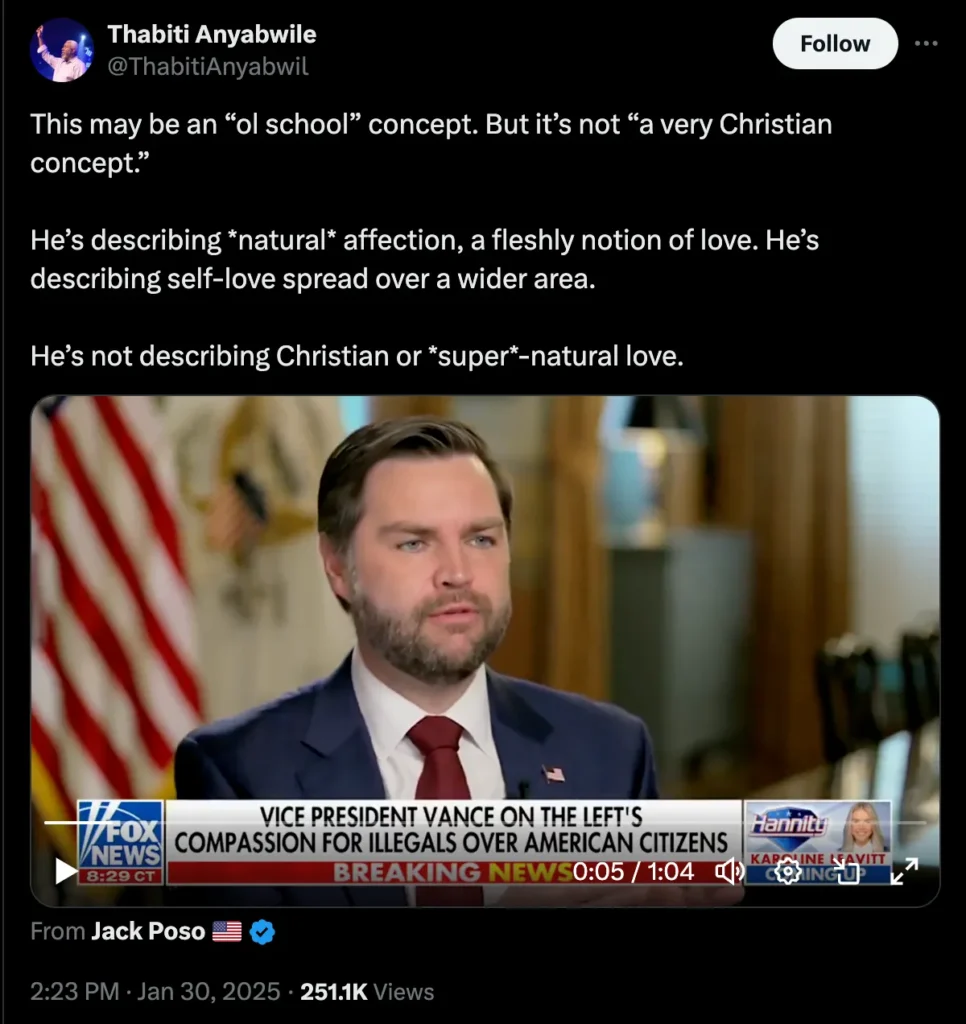Vice President Vance Takes Progressive Evangelicals to School on Basic Christian Teachings
Vice President Vance Takes Progressive Evangelicals to Church on Basic Christian Teachings
How do we determine our moral obligation to others? Is our moral duty to our own family and children identical to a stranger across town? To someone on the other side of the globe?
Vice President J. D. Vance recently caused a stir in a Fox News interview with these comments:
“There’s this old school—and I think it’s a very Christian concept, by the way—you love your family, and then you love your neighbor, and then you love your community, and then you love your fellow citizens, and your own country, and then after that you can focus and prioritize the rest of the world.
A lot of the far Left has completely inverted that. They seem to hate the citizens of their own country and care more about people outside their own borders. That is no way to run a society.”
Sidebar: Can we just take a moment to bask in the glow of a sitting Vice President leading a public discussion of Christian theology?
It should be obvious that one’s love for his own family should exceed his love for everyone else.
Yet somehow, this statement is controversial to left-of-center Christians, like Thabiti Anyabwile, who remarked that Vance’s statement is not “a very Christian concept.”

Anyabwile is so blinded by his hatred for Trump that he can’t think clearly about the classic Christian doctrine. His comments demonstrate the root problem with “progressive Christian” thinking: They cannot think in categories and make proper distinctions.
They assume that the grace of God flattens out natural affections and inverts the natural order.
Anyabwile goes on to say, “The kind of love that is ‘very Christian’ loves the enemy, the widow and orphan (who by definition not your family), and the stranger (by definition not your clan, ethnicity, race or nationality).”
Every Christian would agree that Jesus taught us to love our enemies, but Jesus did not teach that we must love our enemy in exactly the same way and to exactly the same degree. Progressives can’t grasp the most basic idea that we can truly love two different people while also loving one more than the other.
Anyabwile’s comments are driven by his political commitment to supporting Democrat policies on immigration, but I’ll bet my paycheck that he has a lock on his front door. Doesn’t he want to welcome the sojourner and stranger into his house? Would he be willing to starve his own children in order to feed a stranger’s child?
Progressives live in a fantasy world of abstractions and ideals that simply have no bearing on reality. This is why you can always count on progressives to make foolish and unrealistic claims while simultaneously claiming the moral high ground. The progressive attitude is to “judge us by our intentions, not our outcomes.” And Anyabwile’s social media virtue signal is as hypocritical as it is absurd. False humility may look righteous and pious, but it’s still false.
Ordo Amoris
“Ordo Amoris” means “ordered loves.” It’s a biblical concept first and foremost but was articulated in a more doctrinal sense by Augustine of Hippo and later by Thomas Aquinas. Here is one of the leading Protestant scholars on Augustine, Daniel Strand, explaining it directly from Augustine himself:
Because Augustine and ordo amoris are being spoken of in weird ways it’s time to set the record straight. Here is Augustine near the end of his life, probably 420 AD, in Bk 19.14 in City of God. He spells out of the “order of concord” which is the peace and harmony of society:
“And the order of concord is, first, that a man should harm no one, and, second, that he should do good to all, so far as he can. In the first place, therefore, he must care for his own household; for the order of nature and of human society itself gives him readier access to them, and greater opportunity of caring for them. Hence the Apostle says, ‘But if any provide not for this own, and specially for those of his own house, he hath denied the faith, and is worse than an infidel.’ In this care lies the foundation of domestic peace.” QED

The idea of “rightly ordered loves” and “moral duties” has been a hallmark of orthodox Christian thought for centuries. As Strand also notes, “The whole of Christianity across time and space affirm this. It’s only modern wealthy individualistic Christians living in the West who think they are more spiritual and moral that think otherwise. Should be cause for pause.”
The command to love others does not mean we must love everyone equally. The clearest and most obvious example is the Great Commandment: Our love for God must exceed our love for anything else. And every other love must be “ordered” according to duties and obligations that flow from our highest allegiance to God and what God requires of us.
For example, marriage is a one-flesh covenant relationship. I made a vow before God to love my wife: to have and to hold, in sickness and in health, for better or for worse, till death do us part. My covenant with her requires me to love her differently and more than anyone else. This “one-flesh” marriage union produces children, and parents have a duty to love their children more than other peoples’ children. The fifth command requires us to honor our fathers and mothers. The fifth commandment can also be expanded to include all civil society since society is ordered according to the households that comprise it. Nevertheless, honoring our own father and mother must be greater than the honor we owe to everyone else’s father and mother.
Some texts speak of “love” and “hate” in ways that make Christians uncomfortable, so we need to consider them carefully. In Luke 14:26, Jesus said, “If anyone comes to me and does not hate his own father and mother and wife and children and brothers and sisters, yes, and even his own life, he cannot be my disciple.” Obviously, if Jesus commands us to love our neighbors and even our enemies (Matt 5:44), then the hate he commands in Luke 14:26 cannot be a contradiction. Jesus doesn’t lie or contradict himself.
In Hebrew and Greek idiom, “hate” in some contexts means to “love less.” Malachi 1:2 says, “I have loved Jacob but Esau I have hated.” This does not mean God had a visceral, seething hatred for Esau, but rather, God chose Jacob over his brother. The many theological implications that can be drawn from this observation is beyond the scope of my point. I’m simply asserting that biblical “love” is not a one-size-fits-all command.
Thus, the ordo amoris has become a foundational teaching of proper doctrine: (1) love for God must be supreme, (2) love for any created thing must be ordered and proportional to its place in God’s order, and (3) sin is disordered love.
Progressives, with hearts twisted by Marxism and minds drunk on equality, refuse to accept these basic biblical distinctions.
Hatred for Authority
Another hallmark feature of progressive “Christianity” can be easily spotted if you know what to look for: their assertions are idealistic and unrealistic. I would submit that this comes from their rejection of hierarchies, which produces a boneheaded dirt pile of conclusions decorated with cherry-picked Bible verses.
The rejection of hierarchies is a rejection of the created order ordained by God and thus reflects their inner rebellion against God himself.
God did not make a flat world. God made an ordered world filled with glorious inequalities that should be gladly received with thanksgiving as manifestations of God’s creativity. Some human differences may be due to the fall, but not all. Some people are taller, some are smarter, some are stronger, some are wealthier, some are more beautiful, and so on. These are not bad things; God made the world this way. You can see echoes of this goodness in the Bible’s teaching about spiritual gifts.
Progressives see all these differences as evidence of malice and injustice because they prefer a world of sameness. Full of envy and resentment, they hate every form of inequality, and they consequently try to “even the score” by flattening them all out. The way they do this is to convince everyone that all inequalities are injustices that must be rectified. Then, progressive “Christians” come along with a handful of justice-y Bible verses and convince to convince fellow believers that it is their moral duty to equalize every inequality.
At the bottom, progressives envy the blessings others have; they’re ungrateful blessings they’ve received, and they resent God for what didn’t give them. They see the world in terms of what they lack, not in terms of what they have. Thus, they hate God’s providence and authority.
They have absolutized and globalized their victim mentality. They hate the ordo amoris because it directly opposes the entitlement mentality they’ve baptized.
Conclusion
Whether we like it or not, God’s world is ordered and hierarchical. We can embrace it and enjoy the blessings of living according to God’s design, or we can reject it and live a life of bitterness, like so many progressives.
Frankly, it’s embarrassing to have Christian “thought leaders” and pastors like Anyabwile get schooled on basic doctrine by a politician. Vance is smart, but he’s not a public theologian. Still, he articulated a core Christian doctrine better than a (formerly) respected, reformed Christian pastor.
We should expect more of the same from these progressive Christians over the next four years. Clearly, Trump/Vance have broken their brains.
It’s ironic in a way. These Christian leaders made their careers warning us about making politics an idol.
Now that their hypocrisy is being exposed, the truth has become plain: They were the ones idolizing politics all along.
Share This Story

